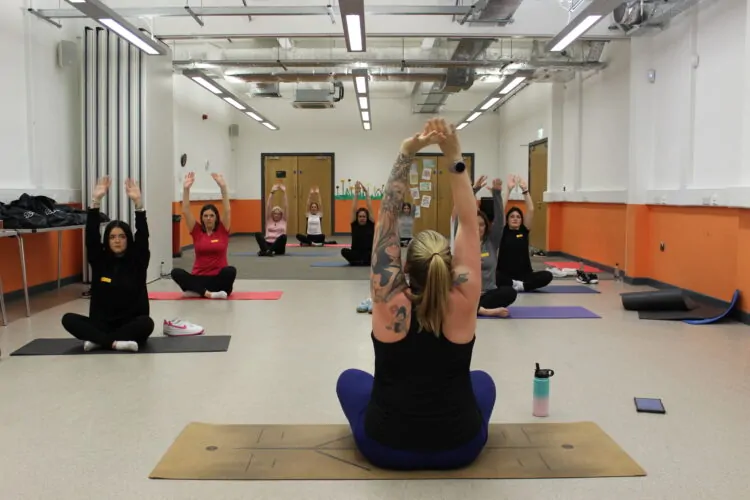
Strong Starts: Reflecting on Our Women’s Gym Introduction Event


Johanne Potts
I am a Level 3 Personal Trainer and Fitness Instructor.
My specialism is in training women going through peri/post menopause, but my clients range from the ages of 11-76.
Having worked with Everybody Health & Leisure for the last five years, I use my knowledge and experience to develop bespoke training programmes, build positive relationships with my clients and support them to achieve their goals.
Published: February 19th 2024
Category: Exercise For Over 50's, Women's Health
Navigating the challenging terrain of menopause can be overwhelming, but there are practical steps women can take to ease the symptoms and improve their overall well-being.
In this blog, we’ll explore 6 effective strategies to ease menopause symptoms and embrace this transitional phase with confidence and comfort.
Menopause is when your periods have stopped for a duration of 12 months. Perimenopause is the time leading up to this point is where women experience changes to their monthly cycle and a number of unpleasant symptoms. It usually lasts for 7 years, but in some cases, it can be as long as 14 years.
Perimenopause usually affects women between the ages of 45-55 but some women can experience it prematurely.
Common symptoms include changes to your mood and cognition, hot flushes, disrupted sleep, fatigue, and muscle aches and joint pain.
Understanding what happens to your body during menopause is the first step to helping you navigate this transitional period.
Your body is used to having a good supply of oestrogen, progesterone, and testosterone, the main hormones responsible for reproductive health. Menopause symptoms occur when hormone receptors in our body no longer receive the same amount of these hormones.
Receptors run throughout our body; in our brain, joints, muscles, heart, blood vessels, urinary tracts, eyes, vagina – all over! Everyone’s physical make up is different, meaning the more heavily affected receptors will vary from person to person. This is why everyone’s experience of menopause if slightly different.
Here are 6 effective strategies to ease symptoms:
Engaging in regular physical activity can significantly alleviate menopausal symptoms. Exercise helps regulate mood swings, reduce stress, and maintain a healthy weight.
Lowering levels of oestrogen make post-menopausal women at higher risk of osteoporosis. It is important for women to engage in strength and resistance training before, during and after the menopause to increase and preserve bone strength, maintain or increase muscle mass, and promote a healthy body composition.
It is recommended that women do at least 2 sessions of strength, resistance, or balance training per week, working on all muscle groups. Including plyometric and aerobic exercises based on jumping, such as squat jumps and jumping lunges can help increase speed, strengthen bones, and retain muscle.
Aim for a mix of cardiovascular workouts and strength training to protect heart and bone health. To enhance overall fitness and mental wellbeing include gentle exercise such as walking, yoga and flexibility exercises.
Nutrition plays a crucial role in managing the symptoms of menopause. Foods rich in calcium, vitamin D, magnesium, and omega 3 oils have been found to help with menopause.
Research has found the Mediterranean diet, which principally consists of plenty of fruits, vegetables, beans, nuts, seeds, and whole grains and unsaturated fats such as olive oil is associated with lower severity of total menopausal symptoms and psychological symptoms.
The Mediterranean diet also includes moderate amounts of dairy foods, eggs, fish, and poultry, and limits sugar, refined carbohydrates, processed foods and saturated fats.
If stomach problems are one of your symptoms, you could benefit from adding fermented foods such as yoghurt, kefir, sauerkraut and kombucha into your diet. These foods are known as probiotics and along with prebiotics they help keep the gut bacteria in balance.
Keeping probiotics and prebiotics in balance can reduce inflammation and improve emotional wellbeing and general health. However, more research is needed for conclusive evidence that probiotics can be harnessed to improve the health and well-being of menopausal women.
Dehydration is a consequence of lowering hormones during menopause. Hormone levels become imbalanced, and the body cannot efficiently regulate the balance of electrolytes and water. Adequate levels of electrolytes is necessary to stay hydrated and their depletion can exacerbate certain menopausal symptoms like hot flashes.
Ensure you stay adequately hydrated by drinking plenty of water throughout the day. Aim to drink a minimum of 2 litres of water every day, roughly 8 glasses.
Herbal teas and infused water can be refreshing alternatives, contributing to overall hydration and potentially easing discomfort.
Caffeine and alcohol have dehydrating effects on the body. For every cup of coffee, make sure you drink an extra cup of water. Limiting caffeine and alcohol intake in general will contribute to better symptom management.
Sleep disturbances are another common symptom of menopause and menopause related insomnia can last for weeks and months if left untreated.
Quality sleep is vital for managing menopausal symptoms such as mood swings and fatigue.
There are few easy things you can do to help you sleep better during menopause.
If sleep disturbances persist, consult with a healthcare professional for personalised guidance.
Chronic stress can intensify menopausal symptoms. Learn what triggers your stress and consider how to take care of yourself physically and emotionally when a situation arises.
Stress reduction techniques include meditation, deep breathing exercises, yoga, or mindfulness practices. There have been some great successes with alternative therapies like massage, acupuncture, or aromatherapy.
These activities and treatments can help slow your heart rate, promote physical and mental relaxation and improve overall mental well-being.
It is important to protect your mental health as well as your physical health when going through menopause. Do not overlook the power of taking time for yourself and doing things you enjoy.
Research shows that mindfulness can help treat or prevent stress-related symptoms of physical diseases and generally improve depression, pain acceptance, coping, and the ability to better control pain in people with chronic pain conditions.
Don’t suffer in silence!
Simply talking to other women going through the menopause can be a great way to reduce stress and anxiety around symptoms. Everybody Menopause Cafés are a safe space for women, often strangers, to gather to eat cake, drink tea and discuss menopause.
Most recently Everybody hosted its first ‘Moving through Menopause’ wellbeing workshop from Alderley Park, with guest speakers including qualified health psychologist, Dr Neesha Patel (founder of Evoking Health Limited) and menopause experts Wellbeing’s Global – keep an eye out for future events coming in 2024!
There are many online practitioners and tools available designed to help women through menopause. It is important that you seek information and support from a reliable source. Dr Louise Newsome and Dr Lisa Mosconi are two trusted practitioners who provide science backed research into menopause via their websites, books, and podcasts.
The Balance App by Dr Louise Newsome is a support tool for women going through perimenopause and menopause. It is the first menopause support app certified by the leading digital health organisation, and ‘allows you to track your symptoms, access personalised expert content, download a Health Report©, share stories in the community”.
Treatment options can be discussed with a dedicated menopause Healthcare practitioner.
Menopause treatments include Hormone Replacement Therapy (HRT), prescription (non-hormonal) treatments such as anti-depressants, and Cognitive Behavioural Therapy.
In conclusion, menopause is a natural part of a woman’s life, and while it may bring challenges, there are practical steps to manage and ease symptoms.
Regular exercise, adopting a balanced diet, staying hydrated, getting enough sleep, and practicing stress-reduction techniques and self-care can help women navigate this difficult time and embrace the changes with a positive mindset.
For personalised advice tailored to your individual needs or to seek treatment options always consult with healthcare professionals.
References:
What is menopause – https://www.nia.nih.gov/health/menopause/what-menopause#:~:text=The%20menopausal%20transition%20most%20often,begins%2C%20and%20race%20and%20ethnicity
Common symptoms of menopause and perimenopause – https://www.nhs.uk/conditions/menopause/symptoms/
Reproductive hormones – https://www.endocrine.org/patient-engagement/endocrine-library/hormones-and-endocrine-function/reproductive-hormones
Why is strength training important for menopause – https://www.bupa.co.uk/newsroom/ourviews/strength-training-menopause
How the Mediterranean diet can help menopausal symptoms – https://www.balance-menopause.com/menopause-library/how-the-mediterranean-diet-can-help-menopausal-symptoms
Spotlight on the Gut Microbiome in Menopause: Current Insights – https://www.ncbi.nlm.nih.gov/pmc/articles/PMC9379122/